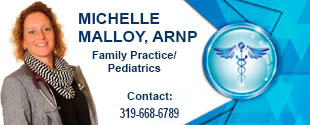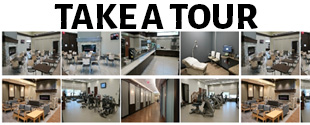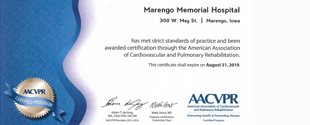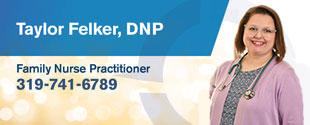
News Articles Continued
A 2013 survey by the Iowa Hospital Association documented that the Hawkeye State's 118 community hospitals have an enormous economic impact. According to IHA, annually Iowa's hospitals provide more than 71,000 jobs and pay in excess of $4 billion in salaries and benefits. That puts hospitals collectively among the largest non-agricultural employers. And that's just direct employment.
When one adds in the additional jobs in communities across the state that exist because of hospital spending and the dollars spent by their employees, the IHA estimates that about just short of 130,000 jobs are tied directly or indirectly to the hospital industry. The overall economic impact on the state's economy is calculated to be approximately $6 billion a year.
Here in Iowa County, Marengo Memorial generates jobs and adds 149 jobs and adds nearly $10 million to the Iowa County economy, also according to the IHA report.
But the impact is even greater than that. Compass Memorial Healthcare employees support Iowa County businesses to the tune of $3 million being spent on Main Street. Hospital employees pay taxes that support schools, roads, parks and other vital infrastructure. Again that's $170,000 in just sales taxes.
But Marengo Memorial is more than jobs, income, retail sales and tax revenue. And it's even more than the high quality health care that is provided here every hour of every day.
Think of the employees who work at the hospital and what they bring to the communities at our schools, churches and volunteer groups. Think of the many young professionals who come here to start a career at the hospital and stay because in rural communities, hospitals are still one of the best places to grow a career.
Think of how they build homes, start families, strengthen neighborhoods and put down roots. Think of how important - and challenging - that is for any community in Iowa in this time of rural "brain drain."
There are many reasons to take pride your Compass Memorial Healthcare. It's no exaggeration to assert that its success contributes mightily to the ability of our towns and region to thrive. Not only is it vital to the health of people who live here and in surrounding counties, but it also contributes to the ability of our area communities to prosper economically.
Cindy Tindal, Board Chair of Compass Memorial Healthcare commented, "We are immensely proud of our significant economic contributions to Iowa County. Our success at Compass Memorial Healthcare is a reflection of the pride all those employed here takes in providing exceptional service to our communities. We look forward to continued success and for the support of the people we serve."
Local QRS groups receive donation
by Brian Rathjen on JUNE 25, 2014Tuesday May 20, Compass Memorial Healthcare hosted an area EMS Appreciation Dinner at the Marengo American Legion for EMS providers and their families. Area QRS (Quick Response Service) groups each received a $250 check from Compass Memorial Healthcare to be used for training costs or the purchase of equipments.
Receiving checks from the hospital were EMS personnel from Amana, Ladora, Millersburg, North English, Victor, Parnell, Williamsburg as well as the Blairstown and Belle Plaine Ambulance Services. Also attending were Iowa County Ambulance staff. Following dinner, training was held for all in attendance on the Cloverdale Stroke Project.
"The work of EMS and QRS providers throughout our area has a substantial impact on the recovery of patients and the overall outcomes they experience during subsequent care received for their emergency condition," stated Barry Goettsch, CEO. "We are fortunate to have trained volunteers who willingly assist those in our area when needs arise."
National EMS week has been observed since it was first declared by President Gerald Ford in 1974. It is an opportunity to recognize those individuals who provide the day-to-day lifesaving services of emergency medicine's "front line."
Dr. Ben Miller, Mindi Jorgenson join Compass Memorial Healthcare staff
By Jim Magdefrau on JUNE 25, 2014Compass Memorial Healthcare has a couple of new faces that are working with the public these days.
Mindi Jorgenson recently came on board as the hospital's pharmacist. Benjamin Miller will start July 14 with the hospital and work in family medicine, working at the Family Medical Clinic in Marengo and also make inpatient rounds at the hospital.
Below are their introductions to the community:
MINDI JORGENSON
Mindi Jorgenson's belief is to give the people she works with the best and safest care possible.
"I do like being able to visit patients in their room," she said, "and I'm looking forward to getting to know the community."
At a small-town hospital, you can do that more freely, and when Jorgenson and her family were looking to re-locate to Iowa, Compass Memorial Healthcare had the things she was looking for. Jorgenson began her job as pharmacist for the hospital in May. Her main duties include reviewing medication orders for appropriateness, making dosing adjustments and assisting with the hospital's diabetes program.
She has an extensive background, given her work with a program provided through Park Nicollet in Glenwood, Minn.
"Up there, I would see patients in the diabetes clinic and I would do insulin starts for people who are starting insulin therapy," she said. "I would do education on diet, exercise, medications and labs. I would also attach continuous-glucose monitors to patients, to make therapy adjustments and insulin pump starts."
Here, at CMH, those will be just some of Jorgenson's focuses. Medication safety will also be a part of things, such as helping patients on warfarin for blood clots, strokes or heart attacks. "A lot of times its formula management, managing what drugs we keep on stock," she said. "There's usually several drugs in a drug class, there's one that's cheaper than the rest of them, so being able to substitute that in place of the more expensive alternative." Jorgenson, a graduate of the University of Iowa School with a degree in pharmacy, and her husband, Jeff, are natives of Newton. The couple have two children: 5-year-old Olivia and 7-month-old Isaac. "I definitely prefer the smaller, critical-access hospitals. There's more for me to do and time to get it done right the first time," she said.
BENJAMIN MILLER, DO
Initially, Benjamin Miller - whose mother, Cindy, is principal at Iowa Valley Elementary School - was going to be a mathematics major at Wartburg College.
"I just knew math and science I was a little bit stronger at in high school, so I decided, 'Let's explore that,'" he said.
Then he began to do job shadowing, and eventually took to the medical field and found that working as a nurse's aide at a nursing home was something he really liked. He ended up earning his bachelor's degree in biology. "It made me feel part of people's care, but I wanted to be more than a nurse's aide," he said. "I wanted to provide as much as I could for patients. It got me thinking about what I could do for people." And so, after pondering a number of different options, he decided family medicine was one of those specialties where he could have it all, but still work with specialists when needed.
"The whole time at the end of medical school, I've really been interested in rural family medicine," he said.
Thus, the road to becoming a family practitioner began. On through a year of being a patient care technician at St. Luke's Hospital in Cedar Rapids, graduation from Des Moines University in 2011 (where he was at one point a teaching assistant), and finishing a three-year residency program with the Cedar Rapids Medical Institution, his goal of being a family doctor was on track.
Now, it's led back to a place that's (almost) home. Marengo isn't too far from Miller's hometown of Van Horne, where he graduated from Benton Community High School in 2001 and excelled in athletics. In wrestling, he was the state-runner up in Iowa Class 2A at 160 pounds his senior year, and is a multi-time state qualifier in track. "I looked at the options that were close, as my wife and I have family close … and Marengo was a great opportunity," he said. "I'm attracted to the hospital, the size of the town and the people. And Barry Goettsch (chief executive officer) had a part in that (coming here). He'd been recruiting me and was really able to show us what Marengo had to offer."
He and his wife, Bobbi, an administrator at Kirkwood Community College in Cedar Rapids, have a daughter, 1-year-old Ava.
"A lot of people say that, oh you know it's just how ever long's in your contract, you can see if you like it …," Miller said. "I've kind of been of the mind I want to find some place I want to settle, put down roots and stay. I want to find a place to stay, and Marengo has the potential to be that place."
HOSPITAL NEWS - Degen to be registered nurse at WFMC
By JANE BIGBEE on May 8, 2014Sarah Degen, Williamsburg, will be one of the registered nurses working in the new Williamsburg Family Medical Clinic, 498 North Highland. The clinic opened Monday, May 5. She will be doing general patient care including rooming patients, taking their vital signs and medical histories, giving immunizations and doing blood draws. She is no newcomer to the Marengo Family Medical Clinic, or other clinics held in the same building, where she has worked most of the last 22 years. She has certifications in advanced life support, pediatric advanced life support, etc. In addition Degen has accompanied Dr. Mark Siebrecht on his outpatient podiatry clinics to Belle Plaine and Virginia Gay Hospital, Vinton. Dr. Siebrecht is on staff at Compass Memorial Healthcare.
Degen also works part-time as a paramedic for the Iowa County Ambulance Service, and she is a volunteer with the Williamsburg First Responders. Degen, who graduated from HLV High School in 1990, began working at the Marengo clinic in 1991 as a certified medical assistant after completing the CMA program at Kirkwood Community College, Cedar Rapids. Through the ownership and transition of the clinic through the University of Iowa Hospitals and private practice, Degen maintained employment at the Marengo clinic. When Compass Memorial Healthcare resumed operation of what has been known now for a number of years as the Family Medical Clinic, she returned to work in this clinic.
Meantime, Degen went to the School of EMS operated by Mercy and St. Luke's hospitals, Cedar Rapids and now a part of KCC, finishing this program in 1998. She has worked part-time for the Iowa County Ambulance Service the last 16 years as a paramedic. She took time out from full-time work to return to Kirkwood Community College to earn her degree as a registered nurse in 2002. During this time she worked one or two days a week at the UIHC Clinic in Belle Plaine. She returned to work full-time at the Marengo Clinic on the completion of her degree. When she has time, Degen enjoys walking and exercising at the Williamsburg Recreation Center.
FAMILY
Sarah Degen's husband, Jon, has been an Iowa State trooper the last 23 years and is also one of the pilots for the Iowa Highway Patrol. Among other duties are the Iowa Hawkeye radio traffic reports in the fall. Jon Degen is also currently vice president of the Marengo Golf Club, is a past president and serves on the board.
The couple and their two sons live north of Williamsburg. Son, Jack, 13, is a seventh grader, and Joe, 10, is in fourth grade, both at Williamsburg. Jack's interest in all sports keeps the family busy. Joe is a history buff and likes to collect coins. Jon also has a daughter Amy, 27. The family attends St. Mary's Catholic Church where Jon Degen does Eucharistic ministry, Jack does altar service, and Sarah is a substitute teacher for religion classes. Sarah Degen's parents are Robert Pirkl and Sharon Huedepohl, both Victor. Jon Degen grew up in Bancroft, in north central Iowa.
HOSPITAL NEWS: Opening of Williamsburg Family Medical Clinic nears!
By BENJAMIN S. EVANS on April 16, 2014The newest addition to Iowa County's local healthcare landscape, Compass Memorial Healthcare's Williamsburg Family Medical Clinic, 498 N. Highland St, opens for tours on Friday, April 18.
The clinic is set to see patients around the first week of May, said the hospital's director of clinical operations Denise Kaestner. The clinic will be open from Monday to Friday, from 8 a.m. to 5 p.m. In the future, the clinic will add extended hours, including Saturday hours to better suit community members' schedules.
The primary care facility will offer all services related to family medicine, from the pediatric to adult and elderly care, including preventative practice, women's health, health maintenance, urgent acute illnesses and a radiology unit. The clinic will also be able to do lab work, which will be processed at Compass Memorial Healthcare.
Kaestner said the clinic will be able to service the Williamsburg area more efficiently, as she said the hospital in Marengo services has a lot of patients in of the Williamsburg area. The added benefit of having a local clinic affiliated with a local hospital, she said, is convenient.
"The Williamsburg area has exponentially grown over the years and we felt we could help meet a demand here (through our care)," Kaestner said.
But the new Williamsburg clinic would not the only primary care clinic in the city limits, with Mercy Family Medicine of Williamsburg already carved into the landscape, along with various other specialized medical facilities in the area. Competition, it seems, comes with community growth.
"Competition is healthy, in any market including medicine," Kaestner said. "We all live in a convenience world, so being able to call and being able to get an appointment the same day, that sort of thing is a big (plus for the community)."
Kaestner stressed the clinic's main purpose continually: to provide local healthcare to local residents.
"We are in a community and we want to care for that community," Kaestner said. "We are local and we want to give back to the service community that we are in. We really are focused on keeping medicine in (the community's) neighborhood."
Construction work on the new Williamsburg Clinic began in August 2013, with the official groundbreaking ceremony on Aug. 29. Despite the "tenacious" winter, Kaestner said, the construction process has been relatively uneventful. Kaestner stressed the importance of the clinic's effort to hire local contractors for the project, keeping local medicine in the local community.
Williamsburg Mayor Frank Murphy said Williamsburg is fortunate enough to have many choices when it comes to health care and the new clinic is just one addition to that fortune.
(The clinic) is a great addition to the community," Murphy said. "To have two exceptional clinics in town, along with an eye clinic moving to the square, we are blessed to have businesses moving into town and expanding the growth of the community."
Kaestner said the clinic is open for tours at the end of the week and the staff would be happy to give tours if community members would like to call either her or Mary Warwick at Compass Memorial Healthcare at (319) 741-6789.
"The clinic is here for the community. We're in medicine for the patient and the patient's sake," she said.
W'burg Clinic looks forward to new receptionist on March 26, 2014
By JANE BIGBEE on March 26, 2014Jessica Wardenburg, Williamsburg, will be the receptionist for the new Williamsburg Family Medical Clinic, 498 North Highland, when it opens in mid-April on completion of the building.
Wardenburg, who has four years previous experience working in a medical office, is currently working in the Marengo Family Medical Clinic, a position started Dec.1, in preparation for the opening of the new clinic. As the receptionist she will be answering telephones, scheduling appointments and checking in patients on arrival at the clinic.
She was the administrative assistant at Williamsburg's Mary Welsh Elementary School eight years so she knows and has worked with people in the community, especially those associated with the school. She also previously worked in a retail store at Tanger Outlet Mall.
Wardenburg will be close to work. She and her husband, Rick, their two daughters, Kenady, 15, and Madison, 12, live next to the clinic.
Rick has worked for Monsanto the last 25 years and is a volunteer Williamsburg fireman. Compass Memorial Healthcare, owners of the both WFMC and MFMC, recently held a health clinic for the Williamsburg Volunteer Fire Department.
The family is active in Immanuel Lutheran Church, rural Williamsburg. The couple also is active in the Williamsburg Booster Club.
Daughters Kenady and Madison have taken cheer leading seven years with Iowa Elite Cheer and been in competitions many weekends.
Growing up Jessica Wardenburg was a member of the 4-Leaf Clovers 4-H Club and was a competitive swimmer from second grade through high school. Now she enjoys going to flea markets and auctions, scrap-booking, gardening and spending time with her family at Lake Thunderhead.
Her parents, Gary and Vickie Williams, recently retired and moved to Missouri, to Lake Thunderhead near Unionville, the place the family enjoys visiting.
HOSPITAL NEWS - Andersen to be mid-level provider at Williamsburg Family Medical Clinic
By JANE BIGBEE on March 19, 2014Personnel who will be working at the new Williamsburg Family Medical Clinic, 498 N. Highland St., have been working and training at the Marengo Family Medical Clinic since late fall. The Williamsburg clinic is expected to open in mid-April on completion of the new building.
Katherine Andersen, R.N., M.S.N., will be a mid-level medical provider at the new clinic, managing patients and being their provider. Andersen, who began training for work at the new clinic at the FMC in Marengo in November, said she has enjoyed having the local resources.
Two registered nurses and a receptionist are currently working and training at the Marengo FMC in preparation for the move to the new Williamsburg clinic.
Compass Memorial Healthcare is actively recruiting a physician for the new WFMC.
TRAINING
Andersen received her Master of Science in Nursing, Family Nurse Practitioner (ARNP or Advanced Registered Nurse Practitioner) in August 2013, from Clarke University, Dubuque. Prior to that she received her Bachelor of Science in Nursing with honors from the University of Iowa, Iowa City, in 2011, and had received her Associate of Science in Nursing with high honors in 2009 from Kirkwood Community College, Cedar Rapids. She received an Associate of Arts with high honors in May 2006.
Andersen received certification last September from the American Nurses Credentialing Center Family Nurse Practitioner, is a member of Phi Theta Kappa honor society, and was the faculty nominee for the 2009 Outstanding Kirkwood Nursing Student of the Year.
She was a recipient for the Anna Purna Ghosh scholarship as well as the Iowa Hospital Association Education and Research Foundation scholarship, Rohde Family and Sara and Henry Katz scholarships.
Andersen had advanced practice clinical rotations in family practice, surgical and dermatological settings; had a RN preceptorship in Mercy Medical Center's trauma department; conducted research on the impact of patient education in anxiety and pain perception; has had experience interacting with, instructing, assessing and treating children in multiple settings including a semester-long preceptorship in the Cedar Rapids Community Schools along with having a variety of other skills and experiences. She also is proficient in use of multiple software programs including EPIC, the one soon to be put in use at CMH and in the summer at the clinics.
During the summers of 2012 and 2013, she worked as a registered nurse in a summer camp in Pennsylvania where her daughters spent two weeks the first summer and four weeks the next summer. Many of the children, who attended camp for the whole summer, were from cities where parents worked all day and lived in apartments.
She worked as an office nurse and had a variety of other responsibilities for Dr. John Vander Zee, FACS, Cedar Rapids, from 2000 to the end of December.
Other work experiences, some of which were part-time, included being a campus health nurse at KCC, a registered nurse at All Heart Staffing, Inc., at Helen G. Nassif YMCA for Childwatch, UI Family Care, a group of multi-provider family practice clinics and an occupational RN at a work site for disabled adults, and conducted periodic health clinics for the U.S. National Guard and U.S. Army Reserve. She also worked part-time as a legal secretary for Ackley, Kopecky and Kingery, LLP, Cedar Rapids.
FAMILY
Andersen and her family currently are living in Cedar Rapids while selling their home before buying one in Williamsburg where they have looked for a home and have visited schools.
Her husband Darrell Andersen works for Alliant Energy. Oldest daughter Jessica is 25, lives in Iowa City and will be married next fall. The younger three daughters are Eleanor, 14, Madalyn, 11, and Elizabeth, or Libby, 9. In the fall Eleanor will be starting high school, Madalyn will be in sixth grade and Libby in fourth. All the girls are dancers and two of them swim.
Andersen stayed home with her children when they were younger, taking a few classes at a time. When it came time to start her nursing studies, she went straight through nursing school with the intention of becoming a nurse practitioner.
Katherine Andersen was born in New York, moved to California when she was 4 and grew up in southern California. Her mother and father are professors and her step-father is a dentist. All three went to UCSC. The family moved to Los Angeles where her step-father went to dental school.
There was not a lot of snow or ice where she was living in San Diego then moving to Orange County, California, leaving her to feel the stress of snow and ice on several occasions in February while driving from Cedar Rapids to Marengo.
Her dad moved to Puerto Rico, and she attended two years of high school there. She didn't know the language and was immersed in an unfamiliar culture. She says she didn't learn as much Spanish as she should have but was able to be conversational and work her way through it. English was taught in the schools. When she visits there now, she finds people do not speak English as much.
Going to school there helped her develop empathy for people in or from other cultures and their languages. She has been trying to get her use of Spanish back and she can understand some of it but not as much as she would like. It does make a difference if a person is trying to understand and making an effort to communicate with a person in the language in which they are more comfortable and willing to share information, she says. She would like to take a course in Spanish.
Andersen lived in New Mexico a number of years, first spending a couple of summers with aunts who lived there, before moving at 18 to Albuquerque.
She worked fulltime as a legal secretary and with her husband owned a family restaurant while they lived in Albuquerque and just outside there in the mountains at Tijeras where his mother and stepfather live.
She describes it as beautiful geographically and a fun place to live, but with issues - lots of crime, drunk driving, not good schools, high teen pregnancy rates and hard times economically depending on people's comfort level with getting ahead. A lead newspaper article she saw while visiting there a couple years ago reported over 50 percent of males drop out of high school.
After a lot of discussion on where to live and rear a family, it was a conscious decision on their part to move to Iowa. Her husband is from Cedar Rapids. It is a decision with which she's been very happy.
"It doesn't get any better than this - Iowa with healthy, happy people," according to Katherine Andersen.
There are the places to visit family - California, the mountains of New Mexico, the beaches of Puerto Rico and a grandmother who lives in the state of New York - after the Andersen family moves to Williamsburg.
"Williamsburg is a neat town; we've been there to visit and are very optimistic we are going to be happy there. It is so positive, friendly and pleasant," Andersen says. It will be a chance for her to take on a new challenge and she is optimistic is will be a great place to live and work. "It's pretty impressive how highly everyone speaks of Williamsburg. Checking it out as a new place is overwhelmingly positive."
HOSPITAL NEWS - Watts to offer cataract services at CMH
By JANE BIGBEE on March 19, 2014Dr. Chris Watts, an ophthalmologist, will begin seeing patients and doing cataract eye surgery at Compass Memorial Healthcare March 20.
Cataract surgery is the most common and needed eye surgery, he pointed out. "Eye surgery is an area of medicine helping people restore or improve their vision, a huge aspect in their quality of life, and a huge area of medicine to practice in."
Through his practice at Eye Physicians and Surgeons, LLP, Iowa City, he already has seen a number of patients who live in this area and who go to Iowa City for eye surgery. Dr. Ryan Striegel, Williamsburg Eye Center, and Dr. Paul Hottel, Eye Associates of Iowa City who also has a practice in Williamsburg, have sent numerous patients to the office where Dr. Watts does surgery. He has worked with these doctors the last two years. It was Dr. Striegel who approached CMH's chief executive officer Barry Goettsch with the suggestion Dr. Watts come to CMH.
When it has been determined cataract surgery is necessary, Dr. Watts will see the patient in Iowa City where he has the equipment for the pre-operative examination. The examination equipment is not available at CMH currently although Dr. Watts is looking for portable equipment to bring here.
He suggests thinking of the eye as a camera. In cataract surgery he replaces the lens with a clear artificial lens implant customized to the eye so the person can see well without glasses. Measurements need to be taken to be able to do this, he continued.
Cataract surgery has gotten much better than in years past, according to Dr. Watts, so the average surgery should take only about 15 minutes with no pain nor discomfort for the patient.
Cataract is outpatient surgery, Dr. Watts continued. Optometrists are skilled in doing the examinations for post operation checkups and are similar to what he would do in his Iowa City office, according to Dr. Watts. Thus the patient can remain in the home area without traveling to Iowa City. Patients feel comfortable and trusting with the team approach seeing their optometrists and the surgeon. If there is anything out of the ordinary at the post-op examination, the optometrist calls Dr. Watts.
Cataract surgery patients, he added, are very happy, thankful and grateful to have eyesight back to what they remember it as being and with surgery taking only a short amount of time. Dr. Watts finds it very rewarding to really improve the quality of life for his patients.
Dr. Watts also sees patients with macular degeneration of the eye who come to the office in Iowa City for injections, sometimes every four weeks. In the future he expects to be able to do the injections for macular degeneration at CMH also.
He hopes to expand other services also at CMH. In addition he does surgery for diabetic retinopathy and laser procedures for patients with glaucoma, as well as eyelid surgery.
Dr. Watts has visited Marengo Memorial to see facilities, meet staff and see how they approach surgery. To begin with he will come to CMH once every three weeks, then more frequently depending on the need.
Dr. Watts did his ophthalmology surgery residency at the University of Iowa Hospitals and Clinics Department of Ophthalmology, his transitional year at Deaoness Hospital in Spokane, Wash., his medical training at the University of Washington School of Medicine, Seattle, and his college in Montana.
FROM SPOKANE
Chris Watts grew up in Spokane, Wash., where his father was a medical doctor in obstetric and gynecology (OB/GYN) for about 35 years. The now retired Dr. Watts' early family originally has homesteaded in Nebraska; then his father's family moved to Peoria, Ill. From there the older Dr. Watts had gone to Tulane University, New Orleans, La., for medical school.
Chris Watts is the youngest child in his family. An older sister is an emergency room doctor in Billings, Mont., and a younger brother a fireman in Seattle. Their mother was a stay-at-home mom when the children were growing up, then attended law school and is now a judge. With studying medicine in mind he thought he was fortunate to have the help and direction of both doctors in his family.
Chris Watts was an all-state basketball player in high school. The 6'6" Watts received a scholarship to play basketball at Carroll College, Helena, Mont., where the team went on to NAIA play. He described Carroll as a sister college to Gonzaga University, Spokane; both being Jesuit schools with similar programs.
Carroll had a very good pre-medicine program, he continued, and he received a bachelor of science in biology and chemistry. Demands of playing basketball and studying were a good background for medical school he found he could concentrate on studying.
He returned to his home state to attend the School of Medicine at the University of Washington in Seattle from 2003 to 2008, graduating with honors.
He received a one-year grant for research within the NIH's (National Institute of Health) Research Scientist Training Program from July 2005 to June 2006.
In medical school he thought he wanted to be an orthopedic surgeon or work in sports medicine. One has to be a general doctor first, he continued, with pretty broad training including delivering babies and working in the emergency room. It was during this training he "stumbled across eye surgery." He found he "loved it with the passion - it was what I wanted to do for a profession."
When he knew he wanted to do eye surgery, an adviser at the U of Washington School of Medicine told him one of the top places to train is the University of Iowa, actually one of the top places in the world for residency in eye surgery. The additional advantage for him, he added, is that it is a smaller city and area in contrast to Seattle.
He had an opportunity to spend a month during medical school at the University of Iowa Hospitals and Clinics (UIHC) and not only liked the university but also Iowa. He was offered a residency spot for training.
Before the UIHC residency, however, he took his transitional year at Deaconess Hospital in Spokane from 2008-2009 and was able to work with his father, before he retired, delivering babies, working in the ER and other areas, or as a general practitioner.
Within a month of coming to the UIHC he realized how much he liked Iowa and Iowa City. "I feel fortunate to have moved out here," he added.
The first year he met his future wife Dacia, from Keokuk. She is a nurse practitioner in family practice. They have seven-month old daughter.
IHA: CMH contributes much to Iowa County economy
March 19, 2014Compass Memorial Healthcare generates 149 full time-equivalent jobs that add $9,992,493 to Iowa County and surrounding community's economy, according to the latest study by the Iowa Hospital Association.
In addition, CMH employees by themselves spend $2,812,386 on retail sales and contribute $168,743 in state sales tax revenue.
"Beyond the direct benefit of payroll and employee spending, hospitals contribute greatly to a community's quality of life, which is vitally important to attracting new residents and businesses. Local spending for health care services also helps to energize the community by keeping dollars circulating in the local economy longer," stated Craig Hamilton, executive director for the Iowa County Economic Development Commission (ICEDC).
The IHA study examined the jobs, income, retail sales and sales tax produced by hospitals and the rest of the state's health care sector. The study was compiled from hospital-submitted data on the American Hospital Association's Annual Survey of Hospitals and with software that other industries have used to determine their economic impact.
The study found that Iowa hospitals directly employ 71,437 people and create another 57,792 jobs outside the hospital sector. As an income source, hospitals provide $4.2 billion in salaries and benefits and generate another $1.8 billion through other jobs that depend on hospitals. In all, Iowa's health care sector, which includes employed clinicians, long-term care services and assisted living centers, pharmacies and other medical and health services, directly and indirectly provides 307,402 Iowa jobs, or about one-fifth of the state's total non-farm employment.
"People are often unaware of the contributions that hospitals make to their local economies, including the number of people they employ, the significance of hospital purchases with local businesses and the impact of their employees' spending and tax support for an entire region," said Kirk Norris, IHA president/CEO. "Just as no one provides the services and community benefits found at community hospitals, there is also no substitute for the jobs and business hospitals provide and create."
The Iowa Hospital Association is a voluntary membership organization representing hospital and health system interests to business, government and consumer audiences. All of Iowa's 118 community hospitals are IHA members.
Compass Memorial Healthcare is a critical access hospital located in Marengo.
IOWA COUNTY BOARD OF SUPERVISORS - Supervisors, hospital review ambulance contract
BENJAMIN S. EVANS on March 6, 2014The Iowa County Board of Supervisors met with Compass Memorial Healthcare representatives and discussed an ambulance contract that would renew the county-wide service currently provided by the two partners Friday, Feb. 28.
Both parties put forward two vastly different contracts, but the main discussion point between the two parties was centered on ownership of the ambulance service, specifically the size and style of the label on the side of the ambulances.
Compass Memorial Healthcare representatives presented a proposal for a new design for the slogan on the side of the ambulances provided by the county in late 2013. In this design, Compass Memorial Healthcare is mentioned, but Iowa County is not.
Compass Memorial Healthcare chief executive officer Barry Goettsch said that the hospital owns the majority share in the ambulance service and that the new contract submitted by the hospital recognizes that ownership.
"The contract provides for reduced cost, fixed cost, continue exceptional ambulance service provided across Iowa County," Goettsch said. "The continuation of the contract we are on right now, which in our opinion, is a lesser contract from the taxpayers standpoint."
However, the consensus of the county board was that the hospital did not have majority share in the ambulance service, but rather the partnership was split 50-50.
"We did not find anywhere where (the contract) made (the service) more favorable for the tax payer, I don't know what you base that on," said board of supervisors chairman Ray Garringer.
The discussion quickly moved from the ambulance contract to which party owned the majority share in the ambulance service.
"We are at a total loss of where this (idea) came from that the hospital owns the ambulance service and you can name it anything you want," Garringer said. "We first heard this from (a third party) that you told them that you own the ambulance and can name it anything you want. Nobody told us and this is a surprise to us, that we don't own our own ambulance service. If we're not the owner, if we're not the contractor, then people ask me (about the role of the board of supervisors), 'does that make you rich Uncle Joe, that you just give them stuff?'"
Goettsch contested that the hospital owns the majority share of the ambulance service, specifically that the hospital has "80 percent of the investment into the service."
The CEO said the ambulance service provides exceptional care to the county, but that the hospital is concerned with compensating the 26 staff people and paying competitively, with increased compensation insurance for employees, and the risk involved with operators of the service.
"What I'm asking for is a recognition that we have a greater share in (the risk it takes to run the ambulance service)," Goettsch said.
Goettsch said the county owns the ambulances, but the hospital provides most of the costs that an owner would take on. Goettsch stressed the county's partnership in the ambulance service is always appreciated, but since the hospital provides the operators, the EMTs, drivers and paramedics, as well as other employees to help run the service, Goettsch said the hospital "has the most skin in the game".
"Last time I checked, an ambulance wasn't on its knees in a ditch taking care of somebody," Goettsch said.
Supervisors said they did not recognize that the hospital was the owner of the service, as the county provides all equipment, the dispatch service, as well as fees associated with the county Auditor's office and the county Treasurer's Office to process claims or warrants.
"We have a lot of 'soft costs' too that (the county) hasn't brought up (in negotiations)," Garringer said. "The ambulance service is a huge strain on the dispatch service and it gets more every year, which we handle without complaint because that is part of contribution to this service."
Without deciding on the contract, the conversation moved to the sticking point of who's name is going to be on the side of the ambulances, with Goettsch saying that Compass Memorial Healthcare does not have an equal representation in the partnership to provide this service.
"I think you are down to splitting hairs because we've have a good working relationship, that's worked for the tax payers and the residents of Iowa County," supervisor Dale Walter said. "And now all of the sudden, you want to change it because you want your name on the side of the vehicle versus Iowa County on the side of it. As far as I'm concerned, we buy (the ambulances), we pay for them, our name is going to be on the side of them."
The board emphasized that Compass Memorial Healthcare's name will still be on the ambulances, just as they are now. The board also emphasized that a public owned vehicle has to be identified, by law, as a public owned vehicle, according to Iowa Code section 721.8.
"From what I'm hearing, the issue is having a name on the side of an ambulance," Jenifer Mein said to Goettsch, who said that the main issue is enlarging the Compass Memorial Healthcare's name on the side of county-owned ambulances. "To me, it shouldn't be about a name on the side of a vehicle, but a quality of service provided, and it sounds like that is being provided. To me, it shouldn't be, 'We want a bigger name identified on the ambulances.'"
The rest of the board members echoed this sentiment.
The two parties decided to consult professional design firms to create and design a new slogan where both partnerships are equally represented in the slogan. The two parties further decided to table the renewal of the ambulance contract until the signage and slogan issue is resolved.
HOSPITAL NEWS - CMH looks at its future needs
By JANE BIGBEE on March 6, 2014Members of Compass Memorial Healthcare's board of trustees under the guidance of Chief Executive Officer Barry Goettsch and Dean Schmuecker, director of facility services, took a nearly two-hour tour of the hospital facility at their January meeting.
This was in response to a report on facility space needs compiled by hospital leadership and presented by Goettsch at their Dec. 4 meeting.
Trustees had both the existing hospital floor and site plans to use as reference as they toured the facilities.
Senior leadership - including Goettsch, Mikaela Gehring, chief operating officer; Teresa Sauerbrei, chief nursing officer; Mary Warwick, administrative assistant; and Matt Murphy, chief financial officer, - compiled a list of what they see as needs and presented by Goettsch at the December meeting.
Goettsch explained leadership had discussed facility needs and concerns. They looked at financial reports and statistics.
It isn't a matter of having staff to care for patients but a matter of having a facility in which to care for them, Goettsch pointed out.
"We are maxed out," he continued. "We have moved patient waiting area for physical therapy out to the common waiting area and it's waiting area for lab and radiology also." The former lab and radiology waiting area is now being used for other purposes.
"We have situations where we can't schedule outpatient clinics because we do not have space. The doctors we are recruiting as our employed providers are family physicians. People we are recruiting, and we're going after, are going to make us A+ players in the health care world today. We have talked about doing OB (obstetrics) again. We have one doctor employed starting July 1 (Dr. Ben Miller) who wants to do OB; he's from this area. He's passionate about providing health care. He can do it."
Goettsch said they have worked with another doctor who also would like to do OB. "It doesn't matter if he is delivering 150 babies a year, he wants to do it because (this is) part of his skill set.
"These are the kind of people who are going to take us to a level folks never dreamed we'd be. We need to continue the mindset to stay on these things, and we need to continue to develop. We have a project going over in Williamsburg (the new medical clinic). That doesn't mean we wait until this project is done to address matters with the facility here," he continued.
In addition to discussing needs over several months, Goettsch said they have talked with their auditing firm Siem Johnson LLC of Omaha, represented by Brian Green, hospital auditor, about how to strategically initiate a project like this while staying with core Critical Access Hospital (CAH) services. This would involve linking depreciation for the project in a way to be reimbursed through expenses associated as a CAH.
"It is something we can capitalize on," he added.
Goettsch explained they also have training for EPIC going on with computers set up not only in the hospital but also in the Ambulance building training center - "they are everywhere."
"It's a great problem to have, but we have to stay out ahead of it," he commented.
At the December meeting he said the next step is considering resources they can bring to help put a plan together. They have blueprints and drawings from the hospital renovation and new building in - 2005-2006 - to plug in where they foresaw need then and where actual need is today. There are similarities and changes.
There is need for a common registration area for outpatients and everyone who comes in. There are now three places where one can register at the hospital.
In answer to a question at the December meeting, Goettsch said they had assumed that when the new square footage was added it was built structurally sound to handle a second floor. It is not. Any growth would come over expanded square footage but footings would be built on appropriate foundations so they could go up to a second floor.
LIST OF NEEDS
Following are needs suggested by leadership.
Sauerbrei, chief nursing officer:
- Bed count - Currently there are 25 beds. Obstetrics could take up four; these would be part of the inpatient count. This unit would be kept under lockdown.
One room is now used for infusions; sleep studies also take one room. Sauerbrei suggests taking these out so they don't take up beds and move them elsewhere.
- Outpatient clinic area - Following discussion with Tina Welsh, Sauerbrei suggests outpatient clinic area with two pods - one with three rooms, one with three rooms and two treatment rooms to be used for chemo/blood patients. The treatment rooms could be "comfy" rooms with recliners. Overall, this will allow two doctors to have outpatient clinics at one time. The area is at full capacity now.
- Inpatient rooms - beds are too small, or short, because rooms were constructed too small. Special beds were ordered and extenders are used on beds for the majority of patients.
- Inpatient restrooms need to be the same. Some of the current ones work well, some were not designed well.
- Respiratory therapy needs to be closer to the nursing area.
Surgery needs to have more space in the center for equipment needed for orthopedic surgeries. A specific OR room for orthopedics might need to be considered.
Schmuecker suggested a need to have a separate room for equipment to heat/cool these rooms. Also discussed were glass doors to separate the rooms.
- Emergency Department - Flow needs to be redone for registration. There are too many entrances into ER. To provide the necessary overflow area for the ER it is suggested opening the current outpatient clinic area to current ER.
- Cardiac rehabilitation needs to be separate from the therapy area.
Suggestions from Gehring, chief operations officer:
- Lab - is too small. The micro lab is across the hall; it needs to be together.
- X-Ray - space will depend on services. If more space is needed, we can move to the street so current space isn't moved.
- Therapy - needs to be a different set up. If a whole new space was opened, this area could be opened for radiology.
- Pharmacy - if obstetrics is added, more space will be needed for storage. There also is a space issue around the refrigerator. The gap between pharmacy and nursing unit was discussed to be enclosed to expand the pharmacy.
- Waiting room - more space is needed.
- Central registration - better flow is needed. Once EPIC is up and running, every patient who comes in will need to be registered. It was suggested seeing how Jones County Regional, Anamosa, handles this.
- Restrooms - more are needed.
- MRI (imaging) - If this is not brought within the hospital, the truck needs to be able to be close to X-Ray. There should be a better way to get people outside to the truck.
Schmuecker, director of facility services:
- Cafeteria if expanded could be opened to the public but will need an entrance for outside guests. Placement of area near medical-surgical area "would be nice."
- Parking is an issue now; adequate spaces should be ensured. Location of the helipad was discussed; if it was moved, this area could be used for parking. If it eventually was placed on the roof, snow removal would be a consideration.
- Purchasing needs to be somewhere in the back of the building next to the street for receiving.
- Equipment/mechanical area will have to be looked at with overhead electrical lines outside, and a new electrical room will be needed.
- Maintenance garage needs to expand.
Mary Warwick, executive administrative assistant:
- Waiting area is too small and the walk from the main lobby to the patient wing is too long for visitors. Patient flow needs to be evaluated.
- Storage space - more is needed. Marketing storage is across the street. It would be helpful to have it in one area.
- Meeting space - more is needed.
Murphy, chief financial officer:
- Office space - there is nowhere to put someone.
- Business office/HIM can be moved wherever but it would work better if not so segregated.
- Admissions should be coordinated and together. Currently there are too many entrances. If the clinics are streamlined, all the registrations could be together.
CEO Goettsch:
- Physical therapy - new area needed.
- Medical surgery - do new and remodel with all private rooms with one or two set up for bariatrics, OB unit, new activity/meeting/multi purpose room.
- Respiratory therapy needs to be near or on the medical surgical unit.
- Surgery - should be new and remodeled with additional surgery suite, pre-op and post-op.
- Specialty clinic - remodel the existing administrative hallway. Occupational health could go in this area also.
- Relocate administration, human resources, organizational performance to the previous therapy space by remodeling.
- Main entrance - new entrance and registration by expanded area.
- Gift shop - larger and expanded.
- Laboratory - Expand lab into previous specialty clinic space by remodeling.
- Food and nutrition - remodel to include a dining hall for public service and a second entrance off the back lot. This would be a new and remodeled part.
- Ambulance - expand the drop off to allow garage doors for protection of patients.
- Helipad - move to the roof above ER.
- Second floor would include conference/banquet facility above the dietary. Use an elevator for access for the helipad.
- Registration - move to a shared registration and common waiting area similar to Jones Regional Hospital, Anamosa.
DEBT CAPACITY
Brian Green, Compass Memorial Healthcare auditor from Siem Johnson, told board members he had been asked to do an analysis for a potential building project and how much money could be borrowed, approximately $15 million.
Green provided what he described as conservative statistics for the initial phase for a Critical Access Hospital based on historical data using the last three years information for Compass Memorial Healthcare.
Long-term debt has come down to $6.79 million for 2013. This is down from $9,035,354 in 2011 when debt was refinanced.
Figures show in 2013, 50.15 percent of costs were reimbursed through Medicare, and the figure is a little higher if Medicaid reimbursement is included.
Income available for debt service in 2013 was $1,772,387. The required debt service coverage ratio was 1.50 - the required covenant is 1.25.
Including income available for debt service, the required debt service ratio of 1.50 and assuming a term of 25-year bond at an interest rate of 5.50 percent, the potential for additional borrowing is $14.691 million according to Green.
The 5.50 percent is probably higher than a USDA (U.S. Department of Agriculture) bond, he said.
His notes also indicated figures were based on continued CAH reimbursement; the interest at 5.5 percent; the required covenant ratio of 1.25, days cash on hand covenant of 70 days excluding bond trustee funds. They do not reflect any additional tax support and do not reflect impact of a capital campaign.
RURAL HEALTH CLINIC
Green also explained medical clinics reimbursement from the standpoint of Medicare and Medicaid. This is important, he told board members, because 60 percent of business at the Family Medical Clinic is Medicare or Medicaid.
There are four types of physician-based clinics, he continued.
Of the four, the free standing clinic has the lowest reimbursement, all of which is based on fee schedule.
The step up is a free standing rural clinic which is cost reimbursed with a per visit limitation of $70.
The next step up is provider-based clinic, one related to a hospital with a sort of hybrid reimbursement with a fee schedule for professional component reimbursement and reimbursement cost for the technical component, as the FMC.
The best reimbursement is the fourth one, a provider-based rural health clinic attached to a hospital.
The key, he said, is that rural health clinics have some special privileges with some special eligibilities and requirements that only certain counties can have rural health clinics.
A change in 2013 creates the opportunity for a physician clinic in Iowa County to become a rural health clinic. With the change both FMC and the new Williamsburg Clinic have the potential for the best reimbursement available.
A provider-based rural clinic would be reimbursed on total cost of clinic services - both the professional, including physicians salaries and benefits, as well as the cost of all support staff, so all could go into the pool to be divided by the number of clinic visits, to arrive at Medicare and Medicaid payment.
He said an analysis on the FMC this year the cost per visit was $157. A free-standing rural health clinic would be limited to $70 even though the cost is the $157. Given the numbers it would appear there would be at least $100,000 in additional reimbursement for the FMC under the new type. For the Williamsburg Clinic with an all fee schedule, reimbursement would depend on volumes. The latter clinic will be reimbursed under the rural clinic cost-reimbursement model.
Potentially, he continued, the new classification is a "very positive thing. There are some hoops to jump through so far as licensure, surveys, certifications, etc." Work on these has started. There are four different agencies to work through, he added.
He also noted the 340B drug program toward which the hospital is working makes drugs available to hospital outpatients, also will be available to patients at the provider-based clinics with physician visits.
HOSPITAL NEWS - CMH receives recognition by iVantage for great care
By JANE BIGBEE JANUARY 15, 2014
Recognition for excellence in efficiency and excellence in quality has been received by Compass Memorial Healthcare for top performance in these categories among all acute care hospitals in the country.
Recognition is from the National Organization of State Offices of Rural Health in collaboration with iVantage Health Analytics. Using iVantage's Hospital Strength Index, CMH has been selected as a top performing rural hospital reflecting top quartile performance.
CMH was one of 15 rural hospitals in Iowa recognized for excellence in quality and was one of 25 recognized for excellence in efficiency.
"We now live, and work, in a more risky, dynamic and complex healthcare environment," iVantage noted. "Federal and state governments are increasing regulatory requirements; employers are reconfiguring employee benefits; and consumers are weighing new healthcare decisions. Healthcare reform has arrived, ushering in an era of change which requires providers to be more informed, flexible and agile.
"As providers strive for accountability and sustainability, the new healthcare requires them to simultaneously expand access, manage care and optimize efficiency, while improving the patient experience, increasing quality and reducing costs. The path to success in this new environment requires the ability to consolidate and interpret the complete picture of operational, financial, clinical, population and market-related intelligence," iVantage continued.
Top quartile performance status is based on quality, outcomes, patient satisfaction, efficiency and overall performance. Rankings are designated by Hospital Strength Index, the first rating system in the country to provide all rural providers, according to their announcement.
iVantage, a privately held company, serves more than 500 hospitals across the United States. It provides comprehensive and objective information products to help hospitals and health systems improve performance, and approach, connects expectations, dashboards, hospital and system level markets, analysis, clinical benchmarking, physicians scorecards and offering quality cost analysis to deliver new perspectives for managing under the new healthcare.
HOSPITAL NEWS - Irland is interim CMH EMS director
by BRATHJEN on JANUARY 8, 2014
Dr. Mark Irland assumed the role of Compass Memorial Healthcare's interim Emergency Medical Services Director on Jan. 1.
The role was previously filled by Dr. Tim Momany, who submitted his resignation after 21 years of serving as the Medical Director of the Compass Memorial Healthcare EMS Department and Iowa County EMS.
"Iowa Department of Health requires all EMS services have a licensed physician to provide medical oversight. We are grateful to Dr. Momany for serving in this capacity and giving of his time for the past 21 years" stated Adam Rabe, director of EMS at CMH.
Irland, a physician in the emergency department at CMH, will operate as a liaison between the service, other physicians, hospitals and the medical community served by the program and will continue to develop and monitor quality improvement procedures. Irland joined CMH in July 2007.
Irland received his medical degree from the University of Iowa College of Medicine in 1996. He did his post-graduate training in a Cedar Rapids family practice from 1996-1999. He also currently sits as the Chief of Staff at Compass Memorial Healthcare.
"Dr. Irland will be a great asset to our team and his qualifications will contribute to this vital service until a permanent replacement has been found," continued Rabe.
The Iowa County Emergency Medical Services is a department of the Compass Memorial Healthcare and employs 26 full and part-time paramedics. This service also helps oversee all the local communities' quick response teams known as QRS. QRS teams are comprised of volunteers in each community that are called to emergent situations to assess/treat patients until the ambulance arrives. Compass Memorial Healthcare and Iowa County work cooperatively in operating these services for the residents of Iowa County.
HOSPITAL NEWS - Term limits proposed by CMH board
By JANE BIGBEEMembers of Compass Memorial Healthcare's Board of Trustees were scheduled to have a special meeting Monday afternoon, Dec. 23, to hear a report from its Governance Committee and discuss bylaws.
At its November board meeting, held Dec. 4, member Randy Fry, who is now in the first year of his second three-year term, asked for a discussion of a board by-law liming a member to two terms of three years each and to look at the structure to go away from term limits.
Fry said he had looked at the board makeup, noting a number of people had served on the board in the past with a lot of experience. Jeff Ritchie, who previously has served as board chair and is its current vice-chairman, will complete his second term in the spring. That, Fry pointed out, then makes him the most senior member of the board with now just under four full years on the board.
Fry asked if there was information from other hospitals on limits for board members. He noted seminars at Iowa Hospital Association meetings the subject had been discussed and seemed to be moving away from term limits.
CMH chief executive officer Barry Goettsch said board composition and skill sets vary as they look for a person is in his/her community and professional skill sets to be brought to a board.
Goettsch said he had contacted 12 hospital CEOs and received a variety of answers. There were three, one of which was Vinton, who had no term limits and had flourishing organizations. Three reported two-year terms, two others reported four-year terms.
A three-year term doesn't seem so intimidating, Fry agreed, and commented the Iowa Valley school board on which is wife Jane serves, has seemed to have trouble getting persons to serve four-year terms.
Adam Grier commented that with three-year terms people do not feel obligated for so long, and Fry agreed there has been feeling they couldn't get people to serve if they felt they couldn't get off of the board.
Board chair Cindy Tindal added, "No one likes change, but people do like change."
Wayne Parizek added having people who are knowledgeable, willing to serve and who can do a good job (is good), he liked the idea of a term but maybe 10 years, "quite awhile."
It takes awhile to go through all of the situations, to know the committees, Fry replied. He pointed out when he first came on the board they were considering member certification, a process taking two to three years then with the term limit at six years. It takes two to three years to be productive, he continued. The board also should look at how it evaluates itself and should there be a problem how it would be handled.
It takes awhile to go through all of the situations, to know the committees, Fry replied. He pointed out when he first came on the board they were considering member certification, a process taking two to three years then with the term limit at six years. It takes two to three years to be productive, he continued. The board also should look at how it evaluates itself and should there be a problem how it would be handled.
Fry said they should look at: How they re-evaluate, training when bringing a person onto the board, requirements, web seminars, potential board members serving on committees or the CMH Foundation board before, people older or younger.
"We have a good board," Fry continued. "There is something to be said for having people know history longer than the last five or six years."
Expanding the pool for board members from the service area has helped, he added.
Ritchie pointed out advertising for new board members had brought six to seven qualified applicants. He said he would abstain from a decision since his term is up in the spring and had not decided if he would stay beyond his present term if there was no longer a limit.
Before discussion concluded Goettsch said with the new Medical Clinic being built in Williamsburg and the rate of growth of hospital and clinic services, "It's nice to have this team together as we focus on what we are doing and keep things moving forward the next five years. It would be advantageous to have the same team dynamic as we are in this growth."
Governance and by-law committees were scheduled to meet.
2013 News Articles
CMH BOARD OF TRUSTEES - CMH board hears updates on services, W'burg clinic
DECEMBER 3, 2013 By JANE BIGBEEDigital mammography will soon be offered at Compass Memorial Healthcare, trustees were told at their meeting Oct. 23, along with hearing reports on increasing hours for ultrasound services, surgery for cataracts and an update on its new Williamsburg Clinic.
An area is being remodeled for the new equipment so the hospital can offer digital mammography in-house, Mikaela Gehring, chief operating officer, told trustees. The service will be brought by Shared Medical whose staff will conduct screenings and train local staff leading to diagnostic services. Gehring explained this will make it possible that when needed the patient may have an ultrasound without waiting a long time or going home only to have to return.
The hospital will do scheduling and billing for the service. The supplier currently does MRIs at the hospital. Mercy's mobile truck has been doing mammography screening at the hospital twice a month.
Hours the ultrasound is available are increasing to four days a week.
Gehring also told trustees a nurse practitioner has been hired for the new Williamsburg Clinic. Katie Anderson was expected to start work soon in Marengo in training for the clinic opening. Other staff has been employed also. New clinic staff had been invited to meet with staff at Highland Ridge, Williamsburg.
Chief executive officer Barry Goettsch said concrete work for driveway, curb and sidewalks was supposed to be completed by the end of the week of the meeting with weather then not such a factor. Goettsch also noted that early in the planning, the hospital's Dean Schmuecker had gone door-to-door in the neighborhood to give these area residents business cards and urging them to call if they had questions or problems with the project.
Teresa Sauerbrei, chief nursing officer, reported ophthalmologist Chris Watts, MD, Iowa City, and Rick Striegel, OD, Williamsburg optometrist, met with the medical staff to discuss doing cataract surgery at the hospital. Dr. Striegel had made the recommendation as the two doctors were looking at ways to get more of the patients care out to the rural area. Their mission goes along well with CMH's, Sauerbrei pointed out.
With the addition of ultrasound equipment recently, providers had visual demonstrations. Sauerbrei also reported they have worked on processes involved with admissions from the emergency department to inpatient area and streamlining them.
Several attended fall sessions of the Iowa Hospital Association, she continued. Patient satisfaction was the subject one day along with utilization review tools and topics on decreasing readmission rates and keeping patients at home longer. Another day the focus was for nurses including accountability, quality and satisfaction. The Studer Group, Portland, Ore., which had made presentations at the hospital several years ago, was the main presenter that day. The hospital's Book Club, using Clint Studer's book, continues wit






























